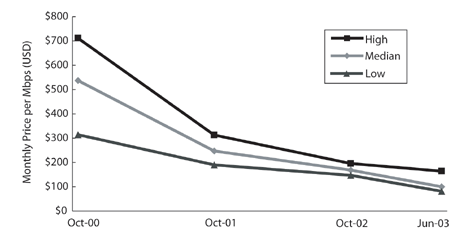When it comes to carrier pricing of IP bandwidth, there's no bottom in sight, says TeleGeography
October 6, 2003

TeleGeography Inc. says carrier pricing of IP bandwidth is still dropping in Western Europe and North America. But contrary to some industry opinion, reductions aren't peggable to carriers returning from bankruptcy.
Instead, price erosion is starting with carriers that are new to the IP market and are eager to get customers -- any customers -- to help build volume.
"The cheapest rates tend to originate from suppliers with low network utilization," says Rob Schult, senior research analyst at TeleGeography, in a prepared statement. "Their attempts to gain market share and to get customer traffic onto the network frequently result in prices that are at or below marginal cost."
Schult's not saying that carriers returning from bankruptcy with fresh balance sheets and reduced debt are innocent of price cutting. These carriers are reducing IP transit prices, too, he notes. But they're not the ones with the most drastic cuts. Those are coming from the young and the desperate.
The report by TeleGeography, which is a research division of PriMetrica Inc., indicates that costs of IP transit connections in Europe and the U.S. have fallen continually over the past three years.
For instance, the firm's research on prices of STM-1 (155 Mbit/s) links in London, based on input from Band-X Ltd., a bandwidth exchange, shows prices getting as low as $50 per Mbit/s, for bandwidth sold in 100-Mbit/s increments. Prices in the U.S. are comparable, Schult says. In Asia, rates are higher, about $130 per Mbit/s, but that's significantly lower than those prices have been, he notes.
Prices in the U.S. are comparable, Schult says. In Asia, rates are higher, about $130 per Mbit/s, but that's significantly lower than those prices have been, he notes.
Reductions in the price of bandwidth haven't boosted demand. In fact, TeleGeography says, worldwide bandwidth demand is now growing at a mere 74 percent a year, on average. This compares with triple-digit growth rates in the boom years, Schult says.
"At some point the carriers are not recovering their investment," Schult adds, "and that takes away their ability to invest in the future."
— Mary Jander, Senior Editor, Light Reading
You May Also Like









